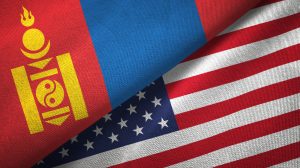On January 20, President-elect Donald Trump will start his second term in the White House. As an incoming president, Trump’s policies toward Mongolia in particular, and the greater Asia-Pacific region in general, will likely be dictated by business connections and personal ties. During the Biden administration, Mongolia-U.S. relations have expanded; however, there are more opportunities for American businesses to enter Mongolia’s market.
When U.S. President Joe Biden took office in 2021, Mongolia’s investment landscape presented a mix of opportunities and challenges for foreign businesses. To American investors and businesses, Mongolia was viewed as a profitable destination, but some key barriers persisted. In promoting U.S. businesses in Mongolia, the American Chamber of Commerce in Mongolia (AmCham) has consistently championed Mongolia as an investment destination, highlighting its strategic potential and fostering bilateral trade and economic cooperation.
During the Biden administration, Mongolia and the United States have continued to strengthen business mechanisms between Ulaanbaatar and Washington, but improving the investment climate was a crucial task. In response to the challenging investment climate, AmCham has played a proactive role and has been working closely with policymakers to advocate for reforms that support U.S. business interests.
Since 2014, AmCham has been hosting the U.S. Trade Doorknock Mission to encourage business leaders from Mongolia to engage with a range of high-level policymakers in Washington, D.C. These policy dialogues help support Mongolia-U.S. joint advocacy for a private sector-driven, free market economy to attract investment. Through Doorknock, AmCham has facilitated connections with key financial institutions like the U.S. Development Finance Corporation (DFC) and Export-Import Bank. These efforts unlock direct access to U.S. financing for businesses, women-owned entrepreneurial projects, fintech, financial services, and telecommunications.
Moreover, in 2023, AmCham submitted over 80 detailed comments on proposed amendments to the Investment Law and now leads a sub-taskforce, in collaboration with the Deputy Prime Minister’s Office, to drive comprehensive legal reforms. Other key initiatives include engaging in government consultations to strengthen the FDI legal framework, launching a public foreign direct investment promotion campaign, and organizing discussions such as the 2022 U.S. State Department Investment Climate Statement panel.
As strategic partners, Mongolia and the United States have expanded major projects such as the Millennium Challenge Corporation (MCC) Compact. The MCC’s $462 million pledge is designed to address the critical water supply challenges in Ulaanbaatar, the Mongolian capital. As of September 2024, $305.5 million (87.3 percent of the grant) has been committed to projects. As a joint endeavor, the Mongolian government has pledged up to $111.8 million to support these investments.
Major investments and projects like MCC highlight the U.S. commitment to addressing Mongolia’s pressing social and economic challenges. As AmCham put it, “The MCC Compact not only improves essential infrastructure but also strengthens the broader U.S.-Mongolia partnership.”
On January 14, 2024, the DFC approved a $150 million loan to the Mongolian Mortgage Corporation (MIK). According to the Embassy of Mongolia in Washington, “This investment is designed to support women borrowers and low- to middle-income households, with the primary objective of enhancing housing accessibility in Mongolia.”
Beyond these examples of financial assistance, one of the major win for Mongolia-U.S. ties during the Biden administration was the 2023 Open Skies Agreement, which will allow a direct flights starting in May 2025.
Despite these positive trends, during the Biden administration, there was no substantial increase in U.S. businesses entering Mongolia. Instead, General Electric, a major U.S. corporation, shuttered its office in Ulaanbaatar. American investors have repeatedly pointed to bureaucratic inefficiencies, unpredictable regulatory changes, and lengthy dispute resolution processes as major challenges in entering and operating in the Mongolian market. In addition, Mongolia’s corruption index did not improve in the last two years.
Another major obstacle AmCham has noted is that Mongolia’s investment is somewhat closed to American businesses. A minimum investment of $100,000 is required for foreign investors to establish ventures, unlike Mongolian businesses, which face no such threshold. Additionally, only Mongolian citizens are entitled to land ownership, with foreign investors restricted to renewable use rights.
Furthermore, though business registration has been streamlined in theory, with provisions allowing foreign businesses – including U.S. companies – to complete the process online through the State Registration Office, the implementation leaves something to be desired. Many U.S. businesspeople believe that the process is not only challenged by bureaucratic inefficacies but also still requires massive manual paperwork, reviews, and approvals, which often extend over weeks or months.
Closing a business is even more challenging, often requiring 18 to 24 months to navigate administrative and judicial hurdles. Regulatory inconsistencies at provincial and municipal levels, compounded by a lack of expertise among inspectors, further complicate operations.
While Mongolia’s strategic location and rich natural resources offer tremendous investment and businesses opportunities, there are domestic issues the government can improve. Issues such as regulatory unpredictability, corruption, bureaucracy, and judicial weaknesses remain significant obstacles. By addressing these issues – through improved transparency, streamlined processes, and regulatory consistency – Mongolia’s traditional and emerging sectors can benefit from investment and business opportunities.
To Mongolia, the incoming administration of Donald Trump can be a fresh start. The president, who signed the United States’ strategic partnership with Mongolia in 2019, will play a key role in strengthening investment profiles and expanding business opportunities between the two countries.
As Mongolia strives to diversify its exports and investment profiles, emerging sectors such as fast food franchises, convenience stores, organic products, and cashmere luxury goods can benefit from U.S. business ties. In the United States, Mongolia’s traditional industries like cashmere apparel and agriculture show strong promise; brands such as Gobi and Quince have successfully entered the U.S. market.
Mongolia-U.S. business and investment relations during the Biden administration have seen important developments, but they have also been tempered by the challenges of Mongolia’s investment climate. AmCham has consistently supported initiatives that align with U.S. development priorities in Mongolia. With a new administration coming to the Oval Office, it is crucial to advocate investments in infrastructure, business climate reforms, and sustainable development projects.

































